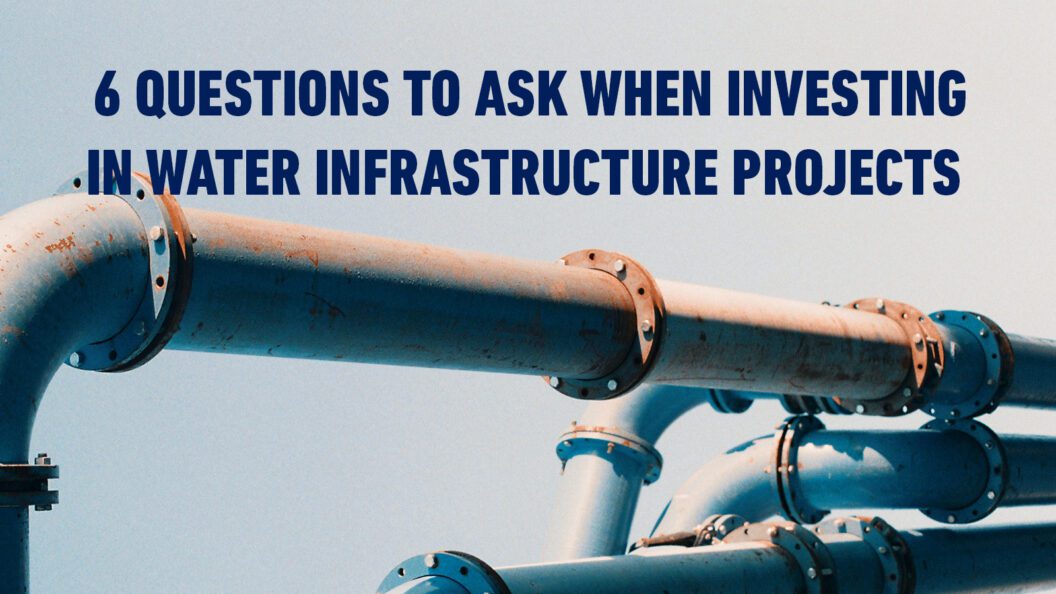Are you concerned with making good long-term decisions to maximize the American Rescue Plan’s impact? We can help.
For decades, wastewater and water infrastructure projects have gotten pushed back due to tightening budgets. The need for improvements runs rampant across the country as outdated and centuries-old systems crumble. But with the passage of pending legislation, local municipalities will have the opportunity to finally tackle these critical issues.
With so much deferred maintenance, it can be challenging to decide which projects to move to the top of the list — and which will offer the most value for your community.
To help you think through your priorities, check out our list of 6 Key Questions to Ask When Investing in Water Infrastructure Projects.
1. Are Any of Your Projects “Shovel-Ready”?
Often, communities begin the preliminary work of launching a project only to find out that the funding they expected fell through or that the cost would be higher than anticipated. In many instances, they’ve already devoted valuable time toward conducting feasibility studies, working through permitting processes, and developing project specs.
These “shovel-ready” projects may help you secure quick wins for your community and recapture some of the time and effort invested before the project stalled.
To identify these opportunities, you may want to reach out to utility operators, city managers and planners, and other communities.
2. Can You Partner to Scale Your Impact?
The American Rescue Plan provides funding to multiple levels of government, including cities, counties, and states. Consider reaching out to colleagues in these other divisions to identify projects where you could partner to expand the impact of these funds. Additionally, you may want to reach out to adjoining counties or municipalities to share costs on a joint initiative that crosses local government borders. You may also want to identify any products or services you might need for various efforts or across government entities. Teaming up in soliciting bids can help you achieve scale and secure better pricing.
3. Can You Build It Back Better?
Many communities’ water infrastructure systems were built more than a century ago — and the world has changed since then! Weather patterns are different, population centers may have shifted, and technology has advanced.
Rather than simply replacing what you have, it may be worthwhile to think about overhauling your system. Questions to ask include:
- Are there new technologies that can make your operations more cost-efficient?
- Do you need to make adjustments to improve stormwater management or control flooding?
- Are you adequately prepared for emergencies, including power outages?
- How will this system fit into your disaster contingency plan?
- Have any neighborhoods grown and stretched the capacity of your system thin?
If you’ve identified a new opportunity but aren’t sure where to start, our team can help! We stand ready to assist you in developing or updating complete water and wastewater systems to fit your community’s current needs.
4. What Are the Long-Term Maintenance Costs?
The American Rescue Plan funding is monumental — but it will eventually run out. When you’re designing a new project or updating an existing system, be sure to evaluate the cost to maintain it for the next twenty, fifty, or even hundred years.
Specifically, you may want to ask these questions:
- How much energy will this system use? Are there ways to cut down on energy costs?
- How easy or difficult will it be to repair if something breaks?
- What sort of preventative maintenance should we consider?
- Do we have the in-house expertise to conduct repairs and maintenance?
- How long can we expect this equipment to last? Are there options that are pricier upfront, but worth it due to their projected longer lifespan?
5. How Will You Prevent or Mitigate Service Disruptions?
If an implementation is not planned properly, updates to your water and wastewater systems can cause interruptions in service. This can result in everything from annoying inconveniences to significant crises. When considering investing in a project, ask the project planners and your local utility operators how they plan to prevent or mitigate service disruptions.
Sometimes, disruptions can be avoided through small fixes like the tank bypass system we created and installed for the City of Ripley. Other times, a more comprehensive solution is needed. For example, when the Hawks Nest Dam underwent its first inspection and maintenance in nearly 100 years, the water level had to be lowered significantly. And that jeopardized access to clean water for the more than 20,000 people in the area who relied on the reservoir. To prevent disruptions to service, we worked with West Virginia American Water to design a system to temporarily bypass the water intake — and keep water flowing to households and businesses who rely on it.
6. Does Your Team Have the Knowledge and Skills Needed to Implement the Water Infrastructure Project?
A massive wave of retirements in the water and wastewater industries has created significant knowledge gaps as operators with decades of experience hand over the reins to talented and dedicated — but green — new recruits.
As a result, many local utilities need additional help implementing new initiatives and maintaining existing systems. When planning new efforts, ask your chief operators about their team’s capacity. Could they use extra hands? Have they managed or implemented similar projects before?
If you need help or advice, give us a call for a free consultation. Our professional engineer, pump applications specialists, and licensed electricians have decades of experience designing, installing, and maintaining water and wastewater systems, flood wall stations, and stormwater management solutions.
We can help you spec out and design even your most complex projects.
Wondering how you’ll prevent service disruptions while you upgrade your community’s water systems? Check out the solution we designed at the Hawks Nest Dam for West Virginia American Water.
Contact us today for a free consultation on your next water or wastewater project!

